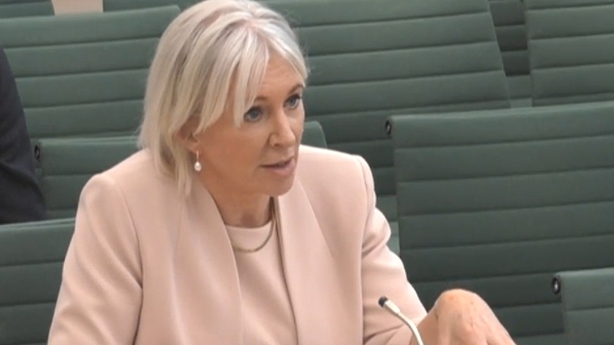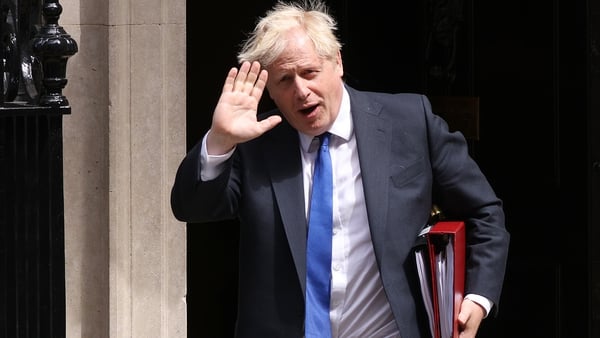Former British Prime Minister Boris Johnson has quit as a member of parliament in a furious protest against politicians investigating his conduct, reopening divisions in the ruling Conservative Party ahead of national elections next year.
Mr Johnson had been fighting for his future with a parliamentary inquiry investigating whether he misled the House of Commons when he said all Covid-19 rules were followed even though parties were held in government buildings during national lockdowns.
Mr Johnson said he was stepping down because it was "clear" that the committee was "determined to use the proceedings against me to drive me out of parliament".
He also chided current Conservative Prime Minister Rishi Sunak for his performance in power.
Parliament's privileges committee had the power to recommend Mr Johnson be suspended from parliament for more than ten days if they were to find he did mislead parliament recklessly or deliberately, potentially triggering an election for his seat.
"I am being forced out by a tiny handful of people, with no evidence to back up their assertions, and without approval even of Conservative party members let alone the wider electorate," Mr Johnson said in a statement.
"It is very sad to be leaving parliament - at least for now - but above all I am bewildered and appalled that I can be forced out."
Mr Johnson, whose premiership was cut short in part by anger in his own party and across Britain over Covid rule-breaking lockdown parties in his Downing Street office and residence, accused the committee of acting of being the "very definition of a kangaroo court".
"Most members of the committee - especially the chair - had already expressed deeply prejudicial remarks about my guilt before they had even seen the evidence," he said.
"In retrospect it was naive and trusting of me to think that these proceedings could be remotely useful or fair."
The committee had no immediate reaction to Johnson's statement.
The resignation will trigger a by-election for his Uxbridge and South Ruislip constituency. It is the second in a day for Prime Minister Rishi Sunak after an ally of Johnson, Nadine Dorries, announced she would step down.
Mr Johnson came to power nearly four years ago, promising to deliver Brexit and rescue it from the bitter wrangling that followed the 2016 referendum.
He shrugged off concerns from some that his narcissism, failure to deal with details and a reputation for deceit meant he was unsuitable.
Some Conservatives enthusiastically backed the former journalist and London mayor, while others, despite reservations, supported him because he was able to appeal to parts of the electorate that usually rejected their party.
That was borne out in the December 2019 election. But his administration's combative and often chaotic approach to governing and the scandals exhausted the goodwill of many of his politicians.
Opinion polls show he is no longer popular with the public at large.
Mr Johnson used his resignation statement to deliver an attack on Sunak's premiership.
"When I left office last year the government was only a handful of points behind in the polls. That gap has now massively widened," he said.
"Our party needs urgently to recapture its sense of momentum and its belief in what this country can do."
Read more
Boris Johnson's resignation statement
Earlier, Mr Johnson's resignation honours list was published.
He rewarded his key Brexit allies and a hairdresser, but not his father nor Nadine Dorries, who has quit as an MP.
Rumours earlier this year that Stanley Johnson was in line for a knighthood, to make him "Sir Stanley", sparked outrage, and fresh claims of cronyism.
However, Mr Johnson senior's name was left off the list.
British prime ministers routinely name close political associates and aides for honours when they leave office, and make appointments to the House of Lords, the unelected upper chamber of parliament.

The highest award is to Bill Cash, who will become a companion of honour, which recognises "a major contribution to the arts, science, medicine or government ... over a long period of time".
The 83-year-old has been a Conservative MP since 1984 and in that time has seen his once fringe view of leaving the European Union become mainstream party policy and the key issue in UK politics since 2016.
He is recognised for "political and public service".
Mr Johnson's fellow Brexiteer Priti Patel, a former home secretary, becomes a dame while Jacob Rees-Mogg, head of a group of arch eurosceptic Tory MPs, becomes a "sir".
Long-time parliamentary hairdresser Kelly Dodge is on the list of awards for advisers, speech writers and personal assistants, as well as Martin Reynolds, Mr Johnson's former principal private secretary.
Mr Reynolds was embroiled in the damaging "Partygate" scandal in which Mr Johnson and Downing Street officials flouted Covid-19 laws the government set, leading to police fines.
Shaun Bailey, a former Conservative candidate for London mayor, who was also accused of breaching social distancing rules, was one of those elevated to the House of Lords.
Ms Rayner also attacked UK Prime Minister Rishi Sunak for signing off on the honours, describing the list as a "carousel of cronies".
Absent though, despite fevered speculation, are Mr Johnson's former culture secretary Ms Dorries and his United Nations climate change conference chairman Alok Sharma.
They were tipped to go into the House of Lords, which would have forced tricky by-elections as they would have had to resign as MPs in the lower House of Commons.
Ms Dorries, however, announced she was stepping down with immediate effect, handing Mr Sunak a difficult electoral test at a time of falling support for the Tories after 13 years in power.

